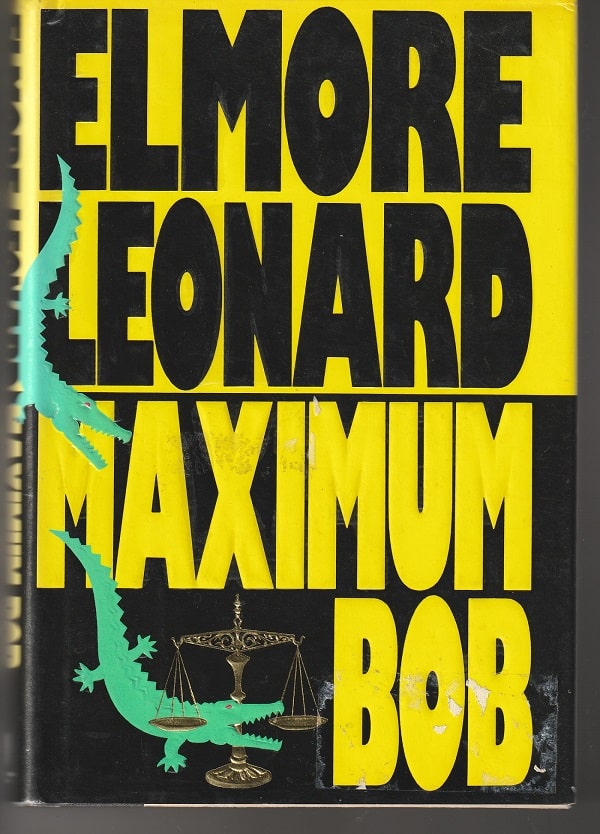Elmore Leonard’s 1991 novel Maximum Bob features, in no particular order:
- A goofy judge who enjoys giving the hardest time to convicted felons and who comes up with a scheme to use an alligator to rid himself of his airy-fairy wife.
- The airy-fairy wife, a devotee of crystals and second sight and spirit guides.
- A spirit guide who was a slave a century and a half earlier.
- A gutsy probation officer who falls in love with a cop and who is romantically pursued by the goofy judge and a clever stone-cold sociopath.
- The stone-cold sociopath who finds himself the target of a rifleman and, ultimately, not so clever.
- A defrocked dermatologist who wears an ankle bracelet while under house arrest for drug sales and who spends much of his time nude out by his pool and ingesting various drugs obtained by his live-in boyfriend-servant.
- The live-in boyfriend-servant who has an affinity for a stripper’s G-string.
- The stripper who is a drug connection and bed partner for the sociopath and who leaves behind one of her best G-strings.
- And assorted other compellingly odd people who get caught up in the various plots taking place.
A fair number of people are killed in Maximum Bob including one the reader doesn’t expect and another who is shot by three women with two guns.
Three women with two guns.
“Pure dumbness”

And Leonard has great fun in telling the story, such as when the judge, Bob Gibbs — he got his Maximum Bob nickname from Newsweek — is ruing the day, seven years earlier, when he married Leanne, the woman he met when she was working as a mermaid at a sea park:
“Why do you drink so much?”
She had told him why enough times that it didn’t matter what he said or if he answered at all. Leanne would maintain that serene, netherworld, airy-fairy expression on her face, one Bob Gibbs had come to believe was pure dumbness…
And when Gibbs is showing off his garden — in the dark, by the light of a flashlight — to Kathy Baker, the probation officers to whom he’s taken a shine.
He had orchids climbing trees and hanging from moss pots. “I deal with ugliness all day long and come home to beauty.
Why was he telling her this? Or why had Elvin [the sociopath] told her about killing a man? The judge and the ex-convict both trying to impress her. The judge showing what a sensitive guy he really was.
“What I need”
And when Gibbs is telling Kathy about how he dislikes having cops hanging around him and following him around since his life was threatened, it seems, by an alligator and a rifleman. And he tells her how much he liked to drive his pickup.
“You know what’s a kick? Drive over to Palm Beach for a function and have one of their cops stop me. Wait for him to swagger up to the window and then let him have it.
“I’ve been to places, these big condo layouts, drive up to the gate going to a cocktail party, the security guard says, ‘No trucks after five p.m.’ I look at him. ‘Boy, you happen to know who you’re addressing?’
“I’m getting too much attention of the wrong kind. What I need is a good capital felony, an open-and-shut first-degree murder. Send the defendant up to sit in Old Sparky and get my image restored.”
“Bad news?”
But Maximum Bob is a crime story, and Elvin is a true sociopath, and so there are moments when, in the midst of Leonard’s comic touches, violence, easy and simple, is enacted. Violent to the body and violence to the soul.
As in this moment when, after committing a murder, he shows up at the home of someone close to the victim and stands at the door as the person takes a phone call and learns about the murder, and, like the cat that ate the canary, Elvin says:
“You get some bad news?”
The quirky ways of humanity
That’s the thing about Elmore Leonard’s novels.
They’re often hilarious. His characters are human in the many quirky ways of humanity. Good guys are imperfect. Bad guys have their interesting and even endearing kinks.
But they are bad guys. And they do bad things. Sometimes, to good people.
Patrick T. Reardon
1.5.23
Written by : Patrick T. Reardon
For more than three decades Patrick T. Reardon was an urban affairs writer, a feature writer, a columnist, and an editor for the Chicago Tribune. In 2000 he was one of a team of 50 staff members who won a Pulitzer Prize for explanatory reporting. Now a freelance writer and poet, he has contributed chapters to several books and is the author of Faith Stripped to Its Essence. His website is https://patricktreardon.com/.
